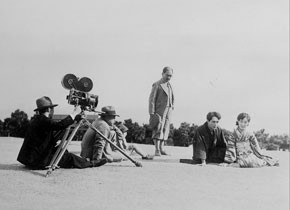Shimizu Hiroshi
February 28 to March 9, 2005
"Ozu and I create films through hard work, but Shimizu is a genius." (Kenji Mizoguchi)
Hiroshi Shimizu, a director greatly admired by Ozu and Mizoguchi, is one of those major Japanese directors who are still barely known in the West, who are still awaiting “discovery”. Like Naruse, Gosho, Yamanaka, and Itô, Shimizu represents one of those "continents" in classic Japanese cinema of the 1930's and 50's who can easily stand up to the famous trias of Ozu, Mizoguchi, Kurosawa. Starting on February 28, the Film Museum presents 13 of his films and offers the rare opportunity to get acquainted with this master filmmaker.
Shimizu began his career in the early 1920s with the newly founded Shôchiku Studios. While his colleague and close friend Ozu, who was the same age as Shimizu, had little success at first, Shimizu quickly became the celebrated star of the studio thanks to his modern melodramas. He left the artificial world of the studios in the 30's, however, and from that time on he preferred to shoot on location. He became, in the words of one of his early film titles, "an itinerant performer". After the War, Shimizu founded his own production company and became one of the forerunners of independent Japanese cinema.
Shimizu's protagonists are often drifters and wanderers with no clear destination. His personal approach to film and his unmistakable stylistic trademarks both derive from this form of movement: long, refined tracking shots, dissolves and superimpositions, episodic structures, the preference for ensemble acting rather than individual performances.
Shimizu's films focus on the fringes of society. Outsiders and outcasts are usually at the centre of his films: vagabonds, prostitutes, petty criminals, street entertainers, war orphans, juvenile delinquents, forced laborers and handicapped persons. Children play an important role, which led to Shimizu's sometimes being considered a director of children's films, an undeserved reputation in light of the immense scope of his work. The smiling children's faces in these films cannot hide the fact that theirs is anything but a perfect world.
Shimizu's art does not manifest itself in large, accusatory gestures towards society but rather in details: his precise observation, the spontaneous turn of events, the delight in improvisation and his love for the seemingly insignificant. The charm and esprit of his films, the lightness and refinement of their mise en scène are what make Hiroshi Shimizu one of the great geniuses in cinema, a master of small things.
The Retrospective takes place with the support of the Shôchiku Studios, the Japan Foundation, the Kawakita Memorial Institute and The National Film Centre of Tokyo. After its presentation in Vienna, the show will travel to Frankfurt, Zurich and Graz.


